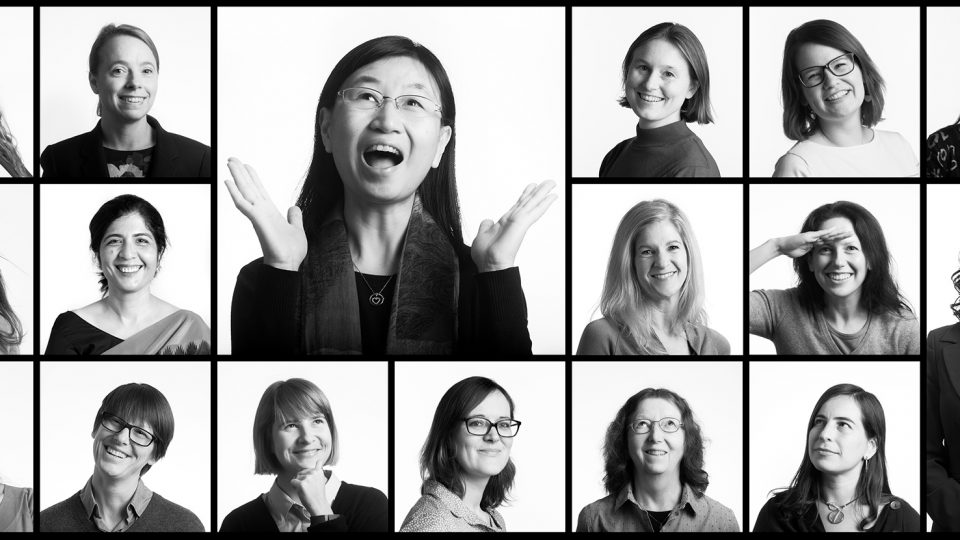This week we are celebrating Computer Science Education Week around the globe.
In this “age of acceleration,” in which advances in technology and the globalization of business are transforming entire industries and society itself, it’s more critical than ever for everyone to be digitally literate, especially our kids.
This is particularly true for women and girls who, while representing roughly 50 percent of the world’s population, account for less than 20 percent of computer science graduates in 34 OECD countries, according to this report.
This has far-reaching societal and economic consequences. Here’s why:
- By 2020, the U.S. Bureau of Labor Statistics predicts that there will be 1.4 million computing jobs but just 400,000 computer science students with the skills to apply for those jobs.
- Computer science is a top-paying college degree and computer programming jobs are growing at a rate that is double the national average, according to a National Association of Colleges and Employers report.
- While 57 percent of university bachelor’s degrees are earned by women, just 12 percent of computer science degrees at major research universities are awarded to women, according to this National Center for Women in Technology infographic.
One issue sometimes cited for the dearth of women in computing fields is the lack of professional role models who could inspire girls to pursue their STEM dreams. We’ve attempted to counteract this by asking 17 women within Microsoft’s global research organization their views on what’s likely to occur in their fields in 2017. Since it’s prediction season, we also asked them to tell us what’s likely happen 10 years from now.
We hope you’ll enjoy their breadth of knowledge and also take a moment to share this feature on your social networks. If that simple act of sharing inspires just one more girl or boy to pursue their STEM passions, you will have contributed to the spirit of the week. Finally, if you believe every student in every school should have the opportunity to learn computer science, you can make your opinion known here.
 Kalika Bali, researcher, India research lab
Kalika Bali, researcher, India research lab
Follow her on Twitter
What will be the key advance in speech and natural language processing in 2017?
Our speech and language technology applications will be increasingly multilingual in 2017. That doesn’t just mean that we will add more languages to our offering. We will do that, but we also will have systems that understand, process and generate the language that an English-Spanish or a French-Arabic or a Hindi-English speaker uses when she effortlessly switches from one language to another, within the same conversation, chat and sometimes even within the same sentence.
What will be the key advance or topic of discussion in speech and natural language processing in 2027?
Language models will be deeply entrenched in cognitive models that enable artificial intelligence (AI) systems to reason and communicate with humans relatively effortlessly, moving between and adapting to different social situations, negotiating, debating and persuading, just as humans do all the time. Computational sociolinguistic and pragmatic models will play a big role in creating socio-culturally aware AI.
 Jennifer Chayes, distinguished scientist, managing director, New England and New York City research labs
Jennifer Chayes, distinguished scientist, managing director, New England and New York City research labs
Follow her on Twitter
What will be the key advance in algorithms for machine learning in 2017?
Deep learning is transforming many aspects of our technology, however deep learning algorithms today are still largely heuristic, based on the experience and intuition of leaders in the field. In 2017, we will develop a more principled understanding of deep learning and hence more robust algorithms. The insights here will come from many fields, including the intersection of statistical physics and computer science.
What will be the key advance or topic of discussion in algorithms for machine learning in 2027?
Our lives are being enhanced tremendously by artificial intelligence and machine learning algorithms. However, current algorithms often reproduce the discrimination and unfairness in our data and, moreover, are subject to manipulation by the input of misleading data. One of the great algorithmic advances of the next decade will be the development of algorithms which are fair, accountable and much more robust to manipulation.
Susan Dumais, distinguished scientist and deputy managing director Redmond, Washington, research lab
Follow her on Twitter
What will be the key advance in search and information retrieval in 2017?
Deep learning in search and information retrieval will come of age. Over the last few years, we have seen breakthroughs in speech recognition, image understanding and natural language processing, which were driven by new deep learning architectures in combination with much more data and computational power. Next year, deep learning models will continue to improve the quality of web search results and will lead to more general improvements in document understanding and query articulation.
What will be the key advance or topic of discussion in search and information retrieval in 2027?
The search box will disappear. It will be replaced by search functionality that is more ubiquitous, embedded and contextually sensitive. We are seeing the beginnings of this transformation with spoken queries, especially in mobile and smart home settings. This trend will accelerate with the ability to issue queries consisting of sound, images or video, and with the use of context to proactively retrieve information related to the current location, content, entities or activities without explicit queries.
 Sara-Jane Dunn, scientist, Cambridge, U.K., research lab
Sara-Jane Dunn, scientist, Cambridge, U.K., research lab
Follow her on Twitter
What will be the key advance in biological computation in 2017?
Despite the widespread use of computational and engineering analogies to ‘explain’ biology, the computation performed by cells need not, and probably does not, bear any resemblance to silicon-based computation. The key advance to come in the short term will be a theoretical foundation for understanding biological information processing, which will be fundamental as we seek to design, modify or reprogram cellular behavior.
What will be the key advance or topic of discussion in biological computation in 2027?
If we can imagine the realization of programming biology, in 10 years’ time we will be developing entirely new industries and applications in areas ranging from agriculture and medicine to energy, materials and computing. While the last 50 years were utterly transformed by the ability to program on silicon, we will be entering the next programming revolution: The era of living software.
Mar Gonzalez Franco, researcher, Redmond, MSR NExT
Follow her on Twitter
What will be the key advance in virtual reality in 2017?
In 2017 we will see the emergence of virtual reality devices that feature better body tracking. A positive outcome of this will be the ability to experience embodiment of virtual avatars from a first-person perspective.
What will be the key advance or topic of virtual reality in 2027?
By 2027 we will have ubiquitous virtual reality systems that will provide such rich multisensorial experiences that will be capable of producing hallucinations which blend or alter perceived reality. Using this technology, humans will retrain, recalibrate and improve their perceptual systems. In contrast to current virtual reality systems that only stimulate visual and auditory senses, in the future the experience will expand to other sensory modalities including tactile with haptic devices.
 Mary L. Gray, senior researcher, New England research lab
Mary L. Gray, senior researcher, New England research lab
Follow her on Twitter
What will be the key advance or inflection point in social sciences in 2017?
Social scientists and computer scientists will join together to develop new methods that map and measure cultural, economic and political “filter bubbles” — online echo chambers of our friends’ news and information — and unpack how they impact people’s everyday “offline” lives.
What will be the key advance, inflection point, or topic of discussion in social sciences in 2027?
By 2027, nearly 30 percent of adults in the United States will do some form of gig work, delivering AI-driven goods and services like tax advice or healthcare support. Consumers may or may not know when they are reliant on a human worker-in-the-loop. The social sciences will play a key role in developing technologies and public policy for a new social safety net of portable benefits to meet the needs of a 21st century AI-powered labor force.
 Katja Hofmann, researcher, Cambridge, U.K., research lab
Katja Hofmann, researcher, Cambridge, U.K., research lab
Follow her on Twitter
What will be the key advance in artificial intelligence and machine learning in 2017?
In 2017 computer games will take center stage in the development of AI. Experimentation platforms based on games, such as Project Malmo — which my team and I have developed to enable AI experimentation in Minecraft – will allow for rapid testing of new ideas. I am especially excited about the potential for collaborative AI. We are now at the point where we can start to understand how AI can learn from us and collaborate with us to help us achieve our goals.
What will be the key advance or topic of discussion in artificial intelligence and machine learning in 2027?
AI is progressing very rapidly. It has great potential to empower people and help us tackle key global challenges. To me, the most important topic of discussion is how to ensure that by 2027 these advances and great potential translate into AI technology that results in the greatest possible benefit to society.
 Nicole Immorlica, senior researcher, New England research lab
Nicole Immorlica, senior researcher, New England research lab
Follow her on Twitter
What will be the key advance in economics and/or game theory in 2017?
As people face increasingly complex decisions in this era of big data, it will become difficult to make optimal choices. Economists will develop new theories about potentially sub-optimal behavior in the face of complexity, and computer scientists will develop automated machine learning tools to help people navigate these scenarios.
What will be the key advance or topic of discussion in economics and/or game theory in 2027?
By 2027, automation will give rise to a new economy in which most people’s societal contribution comes from the data they generate as they go about their lives rather than the work they do. Economists will be talking about ways to fairly compensate people for these contributions. This will most probably involve heavier redistribution of wealth through mechanisms such as taxes or social programs.
 Kristin Lauter, principal researcher, Redmond research lab
Kristin Lauter, principal researcher, Redmond research lab
Follow her on Twitter
What will be the key advance in mathematics and cryptography in 2017?
New mathematical solutions allowing for computation on encrypted data will be deployed to protect the privacy of medical and genomic data for patients and hospitals. The new homomorphic encryption schemes will secure the data while allowing the cloud to compute on it to make useful risk predictions and provide analysis and alerts. Homomorphic encryption will be deployed soon in the financial sector to protect sensitive banking data.
What will be the key advance or topic of discussion in mathematics and cryptography in 2027?
Deep advances in mathematics will continue to be the foundation for next-generation cryptosystems. By 2027 we will have a quantum computer that can break at least low-strength traditional cryptographic systems. For long-term data protection, a first wave of post-quantum cryptosystems is already under development based on recently proposed hard problems in mathematics. With advances in mathematical techniques and algorithms, in 10 years we will see a second wave of post-quantum cryptographic solutions with new proposals and attacks on existing proposals.
Kathryn S. McKinley, principal researcher, Redmond research lab
Follow her on Twitter
What will be the key advance in programming languages and software engineering in 2017?
In programming languages research, the most revolutionary change on the horizon is probabilistic programming, in which developers produce models that estimate the real world and explicitly reason about uncertainty in data and computations. The programming language community is continuing to build the foundations of this new software world and some exciting new applications will emerge by the end of 2017.
What will be the key advance or topic of discussion in programming languages and software engineering in 2027?
By 2027, the majority of software engineers will be facile in programming systems that reason about estimates and produce models with statistical methods. This sea change will deliver applications that seamlessly integrate sensors, machine learning and approximation to interact with human beings in entirely new, meaningful and correct ways.
 Cecily Morrison, researcher, Cambridge, U.K., research lab
Cecily Morrison, researcher, Cambridge, U.K., research lab
What will be the key advance in human-centered computing and accessibility in 2017?
People with visual disabilities will be the power users of personal agents, helping technologists move from hype to transformational technology.
What will be the key advance or topic of discussion in human-centered computing and accessibility in 2027?
All children, including those with disabilities, will have appropriate tools to learn to code. Add 20 years and those children with disabilities will bring their unique experience of the world to change the landscape of technology.
 Olya Ohrimenko, researcher, Cambridge, U.K., research lab
Olya Ohrimenko, researcher, Cambridge, U.K., research lab
What will be the key advance in security and privacy in 2017?
Trusted hardware will inspire new kinds of applications and tools with strong security as their distinctive feature, appealing to users and programmers.
What will be the key advance or topic of discussion in security and privacy in 2027?
Advances in hardware and cryptography will lift data privacy guarantees to a new level: Only an encrypted form of our personal data will be used in medical and administrative analyses, machine learning algorithms and our daily online activities.
Oriana Riva, researcher, Redmond, MSR NExT
What will be the key advance in mobile computing in 2017?
In 2017, systems will increasingly re-architect themselves to support interactions without a graphical user interface. We’ll see fewer users installing apps on their devices and more apps turning into behind-the-scenes services for chatbots and personal digital assistants.
What will be the key advance or topic of discussion in mobile computing in 2027?
The key advance in mobile computing by 2027 will be a significantly expanded relationship with the digital world, encompassing almost any “thing” that exists in our surroundings. We’ll engage with intelligent and personal systems that truly understand us, that we can trust and that know us well enough to anticipate and serve our needs.
Asta Roseway, principal research designer, Redmond research lab
What will be the key advance in ecology, environment and design in 2017?
In 2017 we will see early efforts commence around the Internet of Things for agriculture, including a fusion of ubiquitous sensing, computer vision capabilities and cloud storage to maximize machine learning and analytics. These services, combined with design, will enable farmers to monitor, analyze, comprehend and diagnose the health of their farms from micro to macro levels.
What will be the key advance or topic of discussion in ecology, environment and design in 2027?
Farmers will leverage artificial intelligence streaming capabilities to maintain healthy yields regardless of climate change, drought and disaster. The future of food depends on our ability to preserve and improve the use of our planet’s key resources and reduce over-farmed soil by shifting from traditional farming practices to alternative low energy ones such as vertical farming and aquaponics. Environmental and ecological focus will be on saving our forests with help from advanced sensors and technology while leveraging more urban spaces to shoulder our agricultural needs.
Karin Strauss, senior researcher, Redmond research lab
Follow her on Twitter
What will be the key advance in hardware and devices in 2017?
Moore’s Law has been slowing down. It is getting too expensive to scale general purpose, silicon-based processors and capacitive memories at the same pace as before. As a result, in 2017 we will see a number of new custom hardware accelerators, mostly on FPGA fabrics, proliferate in the cloud to improve performance and lower costs, instead of simply relying on Moore’s Law. Of course, general purpose processors will continue to improve, just at a slower rate. The result will be more interesting, responsive and secure services backed by the cloud. We also will see more virtual reality and augmented reality devices and accessories, both cheap and expensive, come to market. This will result in a number of new applications experimenting with these platforms, as well as interesting developments in content creation for virtual and augmented reality, including 360 degree video recording and similar devices.
What will be the key advance or topic of discussion in hardware and devices in 2027?
From now to 2027, we will witness a number of new technologies that depart from regular silicon scaling come to fruition. Carbon nanotubes and other molecular-scale manufacturing techniques, new architectures such as those that perform computation closer to the data (near data processing), and new computing and storage paradigms such as quantum computers and DNA storage drives may become commercial realities by then. Low power artificial intelligence and near eye displays will see significant improvements as well, resulting in more intelligent devices and higher quality augmented and virtual reality experiences.
 Xiaoyan Sun, lead researcher, Asia research lab
Xiaoyan Sun, lead researcher, Asia research lab
Follow her on Twitter
What will be the key advance in computer vision in 2017?
The key advance in 2017 will be the continued rapid progress in computer vision based on deep learning methods. This will be evident in highly accurate object recognition technologies that approach human ability, lightweight portable vision systems and wide adoption of vision platforms.
What will be the key advance or topic of discussion in computer vision in 2027?
By 2027 the ability for computers to “see” will be ubiquitous as we will have highly developed imaging devices, powerful computing resources and combined deep and wide learning techniques. Advances in these techniques will lead to ubiquitous vision “eyes” that can “see” and empower humans in daily life and all kinds of professions, from manufacturing and health care to finance and security.
Dongmei Zhang, principal research manager, Asia research lab
What will be the key advance in data analytics and vision in 2017?
In 2017, the key technology advance of data analytics and visualization will be in smart data discovery, with interactive, intuitive and instant insights at its core. Such insights will be generated automatically and recommended to users based on their analysis context. The insight generation and recommendation will take into account user response, thus creating an effective and fast feedback loop. Users will be able to complete their analytic tasks more quickly and with less effort.
What will be the key advance or topic of discussion in data analytics and vision in 2027?
In 2027, advances in data analytics and visualization will enable cross-data source and cross-domain analytics at different semantic levels. Individuals will be able to use natural interaction mechanisms, such as natural language, to obtain broad and in-depth information on various aspects of their lives in an easy and seamless way.
Related: To see how our researchers fared in their predictions last year, check out From AI and data science to cryptography, Microsoft researchers offer 16 predictions for 2016.
Photography by Dan DeLong in Redmond, Washington, John Brecher in New York, Jonathan Banks in Cambridge, U.K., Dana J. Quigley in Cambridge, Massachusetts, Mahesh Bhat in Bangalore, India, Michael Svoboda in San Diego, California, and Tong Wang in Beijing.











